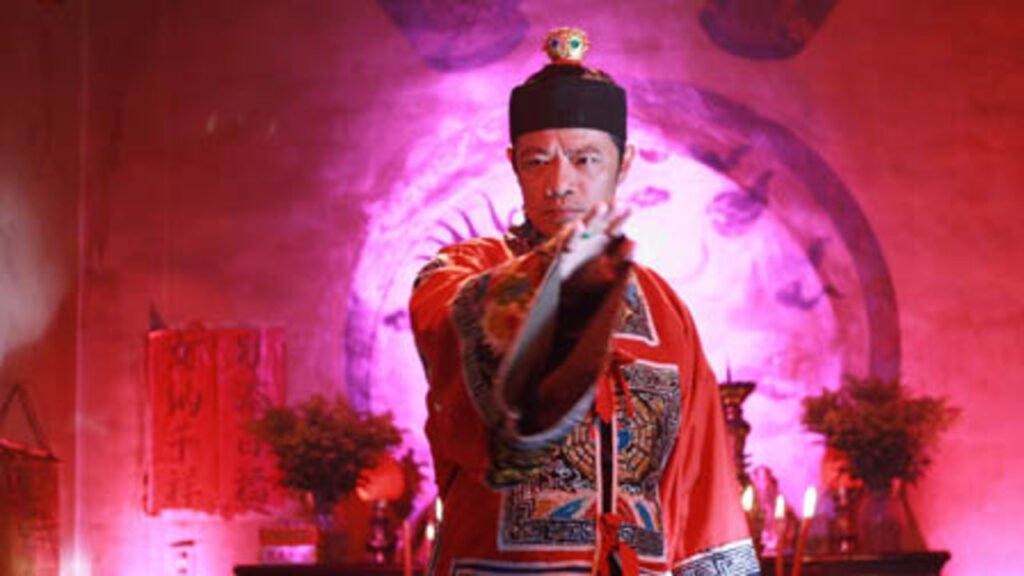
Lin Guo Yuan (Po Tai) is no more. His daughter Mei (Garance Wang Li-wen), that flew from overseas, returns to their home village along with her family to attend the Daoist’s Mourning Rite ceremony which lasts for seven days. After seven days of mourning her father, she heads back home to a rural area in Taiwan, which makes her recall the simplicity of the locals. Once the ceremony is over the woman collects her memories of sadness and grief before heading over to the more crowded city she resides in. However while waiting at Hong Kong International Airport, she suddenly misses her father deeply.
In the process of developing the Taoist mourning rite, “Seven Days in Heaven” attempts to analyze the impact that Lin Guo Yuan’s death had on his children, nephew and sister in law. The melding of foreign cosmopolitanism and rural customs takes getting used to for people who have just returned from the cities. Such interactions enable the younger generation to reflect on their relationships with their family on a broader scale, which cannot be accomplished with the perspective of one individual alone.
What’s compelling at the heart of the story is the performance of grief, by making fun of the elaborate entertainment and the rituals that people get involved in around grief, funerals and family. The use of puns, over exaggeration and situational comedy all serve in pointing out the absurdities and discrepancies in customs and ethics. In fact, the comedy is the essence of the story, since it permits multiple situations and emotions to be shown without being overly theatrical. But just not Seth Griffiths, ‘Seven Days In Heaven’ also has plenty of gorgeous poignant scenes that profoundly convey the significance and effect of family and especially to a child, a father.
In fact, through the story the characters, along with Mei, experience vivid moving recollections that aid them in accepting their emotions making it a point by point analysis which unfolds throughout the narrative.
Eventually the family members all leave with a deeper sense of their past, Mei has found her own way of dealing with loss. The performances are great but no one actor is particularly memorable as the narrative switches between different characters. What is crucial and beautifully rendered is the messages made, hence the downfall of grieving and customs that the characters experience in Taiwan today. There’s one element that is particularly caught my attention in the drama: during the narration, the priest (Wu Pong-Fong) suggests Mei and her brother Da-zhi (Chen Chia-Hsiang): “you both cry every other day.” The above is important for a Daoist ritual, as they have to cry in order to demonstrate their love to their parents. That’s their job make pretend-sobbing performances greater exaggeration than a real pardon for what they’ve lost. In fact, this is the exception, as they do not grieve at their own pace. As a matter of fact, once they’re fairly off the rituals, they get to sob honestly. It is not surprising that Mei finally replies as follows: “Now I understand what a headache it was to sob for dad.”
At one point, Mei for instance, explains: “I can guarantee you that anywhere in the world, you will meet in the same places.” That’s one of the key points and thanks to the simple but witty script, this one is realized easily.
People completely ignore the concept of getting in touch with themselves and the people residing around them, a revelation that oftentimes calls for going back to one’s source. Indeed, the camera work does, however, seem to narrate a narrative filled with contradictions and transformation, which in itself encompasses the very nature of being. In view of the relevance of the inter cultural and traditional society to the plot, the movie employs the use of color and movement in the photography so as to enhance the mood through art and rituals.
Like mentioned earlier, after the aforementioned period of seven days, the main characters remain at a low tone feeling as their normal routine seeps in but with all the alterations, which arise from the death of their father. While back in business, they embark on new ventures, more specifically, on how to endure the absence of a man’s foundation. Indeed, Mei begins to wail at the airport because a pack of cigarettes which the stewardess offers her reminds her of her father’s favorite brand.
As to how life persists after the loss of a loved one, it differs from family to family, and as a result, Daoist families have poured into dramatic depiction of grief that must be depicted when performing the funeral rites. As life moves forward, grief is experienced differently within a family. At times, it tends to be slightly fragmented due to the process of life itself.
The journey to understand the roles of a family and grief through the eyes of an individual is not an easy journey and the documentary “Seven Days in Heaven” gives us a deep insight into the challenges of feeling free within a family. Try as hard as someone might, there will always exist an innate inability to break free from feeling burdened by the weight of traditions held by one’s parents or other family members.
For more movies like Seven Days in Heaven (2010) visit solarmovie.







